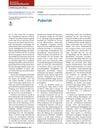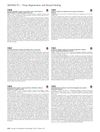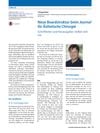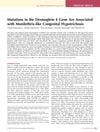Search
for
Sort by
Research
960-990 / 1000+ resultsresearch Faculty Opinions Recommendation of Androgenetic Alopecia Present in the Majority of Hospitalized COVID-19 Patients – The 'Gabrin Sign'

research Faculty Opinions Recommendation of Minoxidil Dose Response Study in Female Pattern Hair Loss Patients Determined to Be Non-Responders to 5% Topical Minoxidil
60% of women who didn't respond to 5% minoxidil for hair loss showed significant improvement with a 15% minoxidil solution.
research Faculty Opinions Recommendation of Randomized Placebo-Controlled, Double-Blind, Half-Head Study to Assess the Efficacy of Platelet-Rich Plasma on the Treatment of Androgenetic Alopecia

research Clinical Utility and Validity of Minoxidil Response Testing in Androgenetic Alopecia
A hair test can accurately predict if a person with hair loss will respond to minoxidil treatment.

research Faculty Opinions Recommendation of Low-Level Light Therapy for Androgenetic Alopecia: A 24-Week, Randomized, Double-Blind, Sham Device-Controlled Multicenter Trial
Low-level light therapy significantly increased hair density and thickness in people with hair loss, but they didn't notice a difference.
research Faculty Opinions Recommendation of a Randomized, Active- and Placebo-Controlled Study of the Efficacy and Safety of Different Doses of Dutasteride Versus Placebo and Finasteride in the Treatment of Male Subjects with Androgenetic Alopecia

research Faculty Opinions Recommendation of Androgenetic Alopecia and Risk of Prostate Cancer: A Systematic Review and Meta-Analysis
Hair loss at the top of the head is linked to prostate cancer, but other types of hair loss are not.

research Puberty
The document concludes that pediatricians play a vital role in supporting adolescents through puberty and should enhance their competence in this area.

research Optimization and Characterization of a Focal Dermal Hypoplasia Mouse Model to Test Potential Treatments
Li2CO3 improved skin disease in a mouse model of Focal Dermal Hypoplasia without toxicity.

research Comparison of Alopecia Areata Induction in C3H/HeH Mice by Injection of Lymphocytes from Mice with Induced vs. Spontaneous Disease
Both induced and spontaneous AA lymphocytes can cause alopecia areata in mice.

research Cetuximab-Induced Hypertrichosis of the Scalp and Eyelashes
A cancer drug caused unusual hair growth on a 100-year-old man's scalp and eyelashes.

research Systemic Autoimmune Diseases: Insights and Advances
The document concludes that systemic autoimmune diseases are complex, incurable, and require ongoing treatment and research.

research Insights into Male Androgenetic Alopecia: Differential Gene Expression Profiling of Plucked Hair Follicles and Integration with Genetic Data
Gene differences found in hair follicles linked to male baldness.

research New Board Structure at the Journal for Aesthetic Surgery
The Journal für Ästhetische Chirurgie expanded its board to improve collaboration and knowledge in aesthetic surgery.

research Hepatitis C-Related Mixed Type Vitiligo in a Patient with Ivemark Syndrome
A patient with Ivemark syndrome developed mixed type vitiligo after a hepatitis C infection, showing different treatment responses and immune cell involvement in the skin.

research A Novel Splice Site Mutation in LIPH Identified in a Japanese Patient with Autosomal Recessive Woolly Hair
Researchers found a new genetic mutation linked to a hair condition in a Japanese boy.

research Androgen Action and 3D Culture Conditions Influence Dermal Papilla Cells' Inductive Properties: The Role of Wnt Agonists/Antagonists Balance
DHT reduces a cell's ability to promote hair growth, while 3D culture without DHT improves it.

research The Endocannabinoid Tone Regulates Human Sebocyte Biology
The endocannabinoid system affects oil production and inflammation in skin cells.

research An Underlying Mechanism of Hair Loss in Acrodermatitis Enteropathica
Zinc deficiency disrupts hair growth and cycle, but zinc supplements can fix this.

research Symposium Proceedings of the 4th Intercontinental Meeting of Hair Research Societies: The World of Hair 2004
The 2004 hair research meeting presented new findings on hair cell differentiation, genetic factors in hair loss, hair pigmentation, and potential targeted therapies.

research Unveiling the Role of Estradiol in the Pathogenesis of Female Pattern Hair Loss

research Epithelial-To-Mesenchymal Transition in Cutaneous Wound Healing: Where We Are and Where We Are Heading
The document concludes that a better understanding of cell changes during wound healing could improve treatments for chronic wounds and other conditions.

research Mutations in the Desmoglein 4 Gene Are Associated with Monilethrix-Like Congenital Hypotrichosis
Mutations in the DSG4 gene can cause a rare hair disorder similar to monilethrix.

research The Paradox of p53: What, How, and Why?
The p53 protein has complex, sometimes contradictory functions, including tumor suppression and promoting cell survival.

research Disruption of Smad4 in Mouse Epidermis Leads to Depletion of Follicle Stem Cells
Disrupting Smad4 in mouse skin causes early hair follicle stem cell activity that leads to their eventual depletion.

research CD4+CD25+FoxP3+ Regulatory Tregs Inhibit Fibrocyte Recruitment and Fibrosis via Suppression of FGF-9 Production in the TGF-β1 Exposed Murine Lung
Special immune cells called Tregs can help prevent lung scarring by blocking a specific growth factor.

research Hair Growth-Promoting Effect of Carthamus Tinctorius Floret Extract
Safflower (Carthamus tinctorius) extract helps hair grow and could be used in hair products.

research Exogen Hair Characterization in Human Scalp
The conclusion is that exogen is a unique hair cycle phase and the new sampling method specifically targets this stage, which may help in future hair loss research.

research Congenital Alopecia Areata
Some babies are born with alopecia areata, and a treatment with clobetasol propionate can regrow hair in half of the cases.